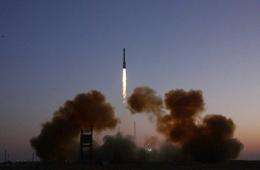A rocket blasts off from the Kazakhstan's Baikonur cosmodrome in September 2010. Russia's space agency has suspended this month's launch of a European satellite after a rocket failed to take its payload into orbit last weekend, Interfax reported on Friday.
Russia's space agency has suspended this month's launch of a European satellite after a rocket failed to take its payload into orbit last weekend, Interfax reported on Friday.
"A decision has been taken to suspend the launch preparations until an interagency commission completes its investigation of the failed launch of the Proton rocket," an unnamed officials at Russia's Baikonur space centre in Kazakhstan told the news agency.
The Russian space agency Roskosmos on Friday said in a statement that initial preparations for the European satellite launch were going ahead "on schedule" but that the launch date would be set after the investigation.
Russia was due to send a telecommunications satellite for Paris-based provider Eutelsat into space on December 20.
The delay comes after a rocket launched from Russia's Baikonur cosmodrome on December 5 failed to put three Russian navigation satellites into orbit after it took the wrong trajectory for reasons that remain unclear.
Initial reports suggested the rocket may have been carrying too much fuel or may have been programmed incorrectly.
If an investigation finds that the Proton-M rocket performed normally, the Eutelsat launch could go ahead this month, but otherwise the launch could be postponed for several months, the space agency source told Interfax.
The satellites that failed to reach orbit were to have completed a navigation system called Glonass that the Russian government is developing as a rival to the United States government's GPS system.
The failure was an embarrassing setback for a costly project that has been backed by Prime Minister Vladimir Putin, who even fitted his dog Connie with a collar with a Glonass transmitter in a publicity stunt.
Russia planned to spend 1.7 billion rubles (55 million dollars) on the project in 2011 after spending about two billion rubles in 2010.
(c) 2010 AFP





















